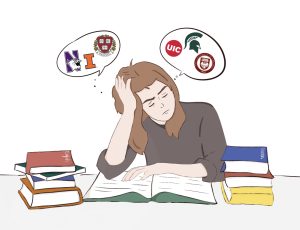Tickets aren’t colorblind
March 4, 2016
Time after time we are presented with the ways in which society privileges people based on factors such as socioeconomic status and race.
Yes, race and social class are two different things but they are very much connected. So it is no coincidence that the racial makeup of one of the most affluent townships in the country is over 85% non-Hispanic White, according to the Census Reporter.
Thus, the majority of New Trier students enjoy the benefits of high socio-economic status, or white privilege, if not both.
One of the stark differences between affluent minors and their less privileged counterparts is how the justice systems deals with them when they break the law. Something many New Trier students are familiar with, getting a ticket, is a perfect example of this disparity.
When a minor here is caught with marijuana, he or she receives, something called a municipal ticket, which, according to police liaison Josue Perez, is not uncommon in this area.
This ticket provides whoever receives it the option of paying a fine of $250 (if they are over 18 years of age) or (for minors) a mandatory hearing; this usually results in some sort of community service. Either way, the minor will not be arrested or have the offense put on his/her record.
Now, if you are caught with any other illegal substance other the cannabis (cocaine, heroin, etc.) you will face the same punishment as everyone else, arrest and a tainted record.
That fact that this option is only applicable to a cannabis related offense may make it seem like much less of an advantage than what it really is. However, when you take into consideration the fact that the most used illicit drug in the United States is cannabis, according to the Office of National Drug Control Policy, the impact it can make comes into perspective.
But how did this system come to be? According to Officer Perez, the high crime rate in Cook County had the courts overwhelmed. The solution? Create a system that gives troubled minors a second chance to encourage rehabilitation, as opposed to having one mistake essentially “ruin” your future.
In less affluent communities, where this is just not an option, any minor caught with marijuana is arrested, the offense put on their record, and likely to spend at least a night in jail. Too often, many continue down a path leading them to spend most of their adolescence in Juvenile correction centers. Something as simple as a ticket for cannabis can make a big difference.
The fact that less privileged minors in the rest of Cook County (and most of the United States) do not have this privilege, proves that this is more of a class (and therefore race) issue. This is another way in which society attempts to keep those less privileged from becoming successful.
Illicit drugs have always been a major issue. But not the way in which the issue is being addressed; the problem is that one mistake can criminalize a child for the rest of their life, simply because they were not born into privilege.
With countless cases of police brutalizing and even killing people from poverty and crime stricken areas (which overwhelmingly tend to be people of color), it becomes quite clear there is much more to fear than just a criminal record.
On the other hand, people from wealthier backgrounds (which overwhelmingly tend to be white) are often not punished for their crimes, and if they are, it is much less severe.
At this point you may still be confused as to why race is as much of a factor as class in this situation. Yes, there are many affluent people of color across the country as well as impoverished white people.
People of color face many obstacles to obtain the same socioeconomic status as their white counterparts. The history behinds this inequality is much too long to explain, but it’s real.
According to the Institute for Research on Poverty, Blacks and Hispanics are more than twice as likely to live in poverty than non Hispanic Whites. With impoverished communities also having the highest crime rates, the connection becomes clear.
When the justice system chooses to only benefit people based on their already existing privilege in society, they are pushing aside those with the highest need.













































